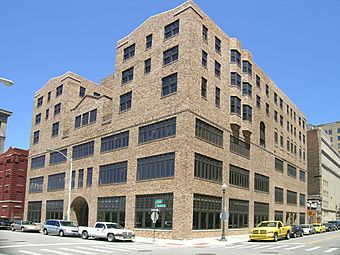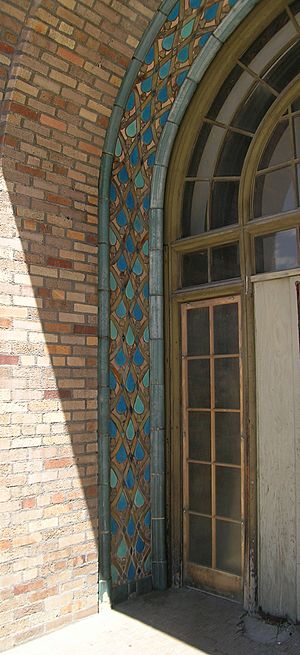Detroit Women's City Club facts for kids
|
Women's City Club
|
|
|
U.S. Historic district
Contributing property |
|
 |
|
| Location | 2110 Park Avenue Detroit, Michigan |
|---|---|
| Built | 1924 |
| Architect | William B. Stratton; Waldridge & Aldinger |
| Architectural style | Arts and Crafts, Early Modern |
| Part of | Park Avenue Historic District (ID97000396) |
| NRHP reference No. | 79001179 |
Quick facts for kids Significant dates |
|
| Added to NRHP | November 20, 1979 |
| Designated CP | May 13, 1997 |

The Women's City Club is a historic building in Downtown Detroit, Michigan. It is located at 2110 Park Avenue. This building is part of the Park Avenue Historic District. In 1979, it was added to the National Register of Historic Places. It was also named a Michigan State Historic Site that same year.
The Club's Story
After the American Civil War, many women became more educated. They started forming groups to work together and make a difference. These groups, called women's organizations, became very important. Their influence was strongest around the time of World War I. This was when the 19th Amendment was passed. This amendment gave women the right to vote.
In Detroit, many women's groups needed a central place to meet. So, in 1919, some local leaders started the "Women's City Club." Their goal was to help women get to know each other better. The club hired an architect named William B. Stratton to design a suitable building. The building was finished in 1924.
What the Building Looks Like
The outside of the Women's City Club building is made of brick. It has a simple, modern design. The building has six stories. The bottom three floors look solid and even. The top three floors seem to sit on top of the lower ones.
The color of the bricks is different between the two sections. The windows also look different on the upper and lower parts. There is a line of bricks that separates the two sections. The lower floors were designed for social events and club activities. The upper floors were apartments for women who moved to Detroit for work. These apartments offered a safe place to live.
Inside, the building has a style called Arts and Crafts. You can see this in the handmade ironwork and the special tiles. These tiles were made by Pewabic Pottery. Even the swimming pool inside the club was decorated with beautiful Pewabic tiles.
How the Club Was Used
The Women's City Club offered many classes and fun activities for women. At its busiest, the club had over 8,000 members! However, after World War II, fewer women joined the club. In 1974, the club moved to a smaller place.
The main building was then used for different things. It even became a restaurant and bar later on. In 1976, a group called Feminist Economic Network bought the building. It was known as the Feminist City Club for a while. Later, Forbes Management owned the building until 2017. They also owned other famous Detroit places like the Elwood Bar and the Gem Theater. Forbes Management even updated the building's outside.
In 2017, the building was sold to a company connected to Ilitch-owned Olympia Entertainment. Olympia Entertainment announced that the building would be fixed up. It is now part of a big new development in Detroit called "District Detroit."
See also
 In Spanish: Women's City Club para niños
In Spanish: Women's City Club para niños

